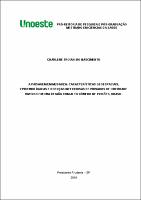| Compartilhamento |


|
Use este identificador para citar ou linkar para este item:
http://bdtd.unoeste.br:8080/jspui/handle/jspui/1216| Tipo do documento: | Dissertação |
| Título: | A paisagem em mudança: características geoespaciais, epidemiológicas e doenças infecciosas de privados de liberdade vivendo em uma região com alto número de prisões, Brasil |
| Título(s) alternativo(s): | The changing landscape: geospatial, epidemiologic characteristics and infectious diseases of inmates living in a region with a high number of prisons, Brazil |
| Autor: | NASCIMENTO, Charlene Troiani do  |
| Primeiro orientador: | Carneiro, Luiz Euribel Prestes |
| Primeiro membro da banca: | Gomes, Jaime de Oliveira |
| Segundo membro da banca: | D’Andrea, Lourdes Aparecida Zampieri |
| Resumo: | Brazil has the third largest prison population in the world. The risk of infectious diseases is higher in prisons than in the general community. We determined the geospatial and epidemiologic characteristics and prevalence of HIV, tuberculosis, viral hepatitis, syphilis, and co-infections in inmates in 28 prisons located in the western and northwestern regions of São Paulo state. Data were obtained through a standard questionnaire from inmates diagnosed with an infection. Locations of prisons and highways were obtained from shape file databases. Data on inhabitants, population growth, and Human Development Index were obtained from public agencies. Of 37,497 inmates, 741 (1.97%) were diagnosed with an infection. HIV was the most prevalent disease (0.68%), followed by tuberculosis (0.66%), syphilis (0.2%), HCV (0.2%), and HBV (0.04%). HIV-syphilis was the most prevalent co-infection (odds ratio, 63.7; 95% confidence interval: 41.4, 96.7). Mean age was 35.82 years (SD, 10.41 years) and 57.9% had been in prison previously. Construction of large prisons beside the radial highways changed the landscape and prevented migration of people from small to large cities. This is one of the biggest studies in Brazil, and the prevalence of infectious diseases among inmates was lower than countrywide. Therefore, improvements in health care are necessary, mainly in screening for infectious diseases. |
| Abstract: | Brazil has the third largest prison population in the world. The risk of infectious diseases is higher in prisons than in the general community. We determined the geospatial and epidemiologic characteristics and prevalence of HIV, tuberculosis, viral hepatitis, syphilis, and co-infections in inmates in 28 prisons located in the western and northwestern regions of São Paulo state. Data were obtained through a standard questionnaire from inmates diagnosed with an infection. Locations of prisons and highways were obtained from shape file databases. Data on inhabitants, population growth, and Human Development Index were obtained from public agencies. Of 37,497 inmates, 741 (1.97%) were diagnosed with an infection. HIV was the most prevalent disease (0.68%), followed by tuberculosis (0.66%), syphilis (0.2%), HCV (0.2%), and HBV (0.04%). HIV-syphilis was the most prevalent co-infection (odds ratio, 63.7; 95% confidence interval: 41.4, 96.7). Mean age was 35.82 years (SD, 10.41 years) and 57.9% had been in prison previously. Construction of large prisons beside the radial highways changed the landscape and prevented migration of people from small to large cities. This is one of the biggest studies in Brazil, and the prevalence of infectious diseases among inmates was lower than countrywide. Therefore, improvements in health care are necessary, mainly in screening for infectious diseases. |
| Palavras-chave: | Tuberculose Prisão Detentos inmates active search co-infection infectious diseases tuberculosis |
| Área(s) do CNPq: | CIENCIAS DA SAUDE |
| Idioma: | por |
| País: | Brasil |
| Instituição: | Universidade do Oeste Paulista |
| Sigla da instituição: | UNOESTE |
| Departamento: | Mestrado em Ciências da Saúde |
| Programa: | Mestrado em Ciências da Saúde |
| Citação: | NASCIMENTO, Charlene Troiani do. A paisagem em mudança: características geoespaciais, epidemiológicas e doenças infecciosas de privados de liberdade vivendo em uma região com alto número de prisões, Brasil. 2019. Dissertação (Mestrado em Ciências da Saúde) - Universidade do Oeste Paulista, Presidente Prudente, SP, 2019. |
| Tipo de acesso: | Acesso Aberto |
| Endereço da licença: | http://creativecommons.org/licenses/by-nc-nd/4.0/ |
| URI: | http://bdtd.unoeste.br:8080/jspui/handle/jspui/1216 |
| Data de defesa: | 14-Fev-2019 |
| Aparece nas coleções: | Mestrado em Ciências da Saúde |
Arquivos associados a este item:
| Arquivo | Descrição | Tamanho | Formato | |
|---|---|---|---|---|
| Charlene Troiani do Nascimento_Resumo.pdf | Resumo | 492 kB | Adobe PDF |  Baixar/Abrir Pré-Visualizar |
Este item está licenciada sob uma Licença Creative Commons





